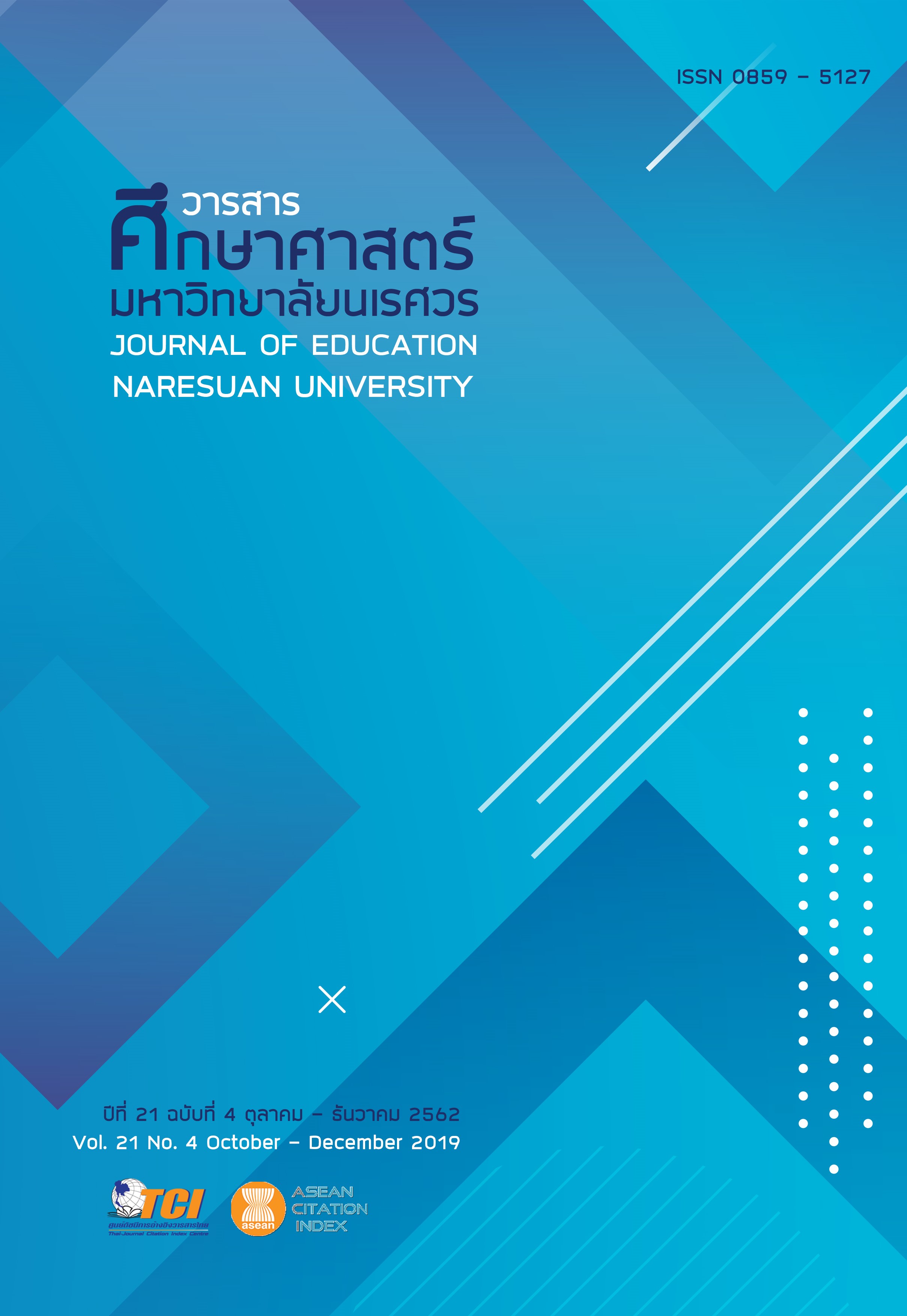ผลของการจัดการเรียนรู้แบบสืบเสาะหาความรู้ (5Es) ร่วมกับการจัดการเรียนการสอนแบบเน้นมโนทัศน์ เรื่อง การสังเคราะห์ด้วยแสง ที่มีต่อมโนทัศน์ทางชีววิทยาและความสามารถในการสื่อสารทางวิทยาศาสตร์ ของนักเรียนชั้นมัธยมศึกษาปีที่ 5 (THE EFFECTS OF INQUIRY LEARNING CYCLE (5Es) WITH CONCEPT-BASED INSTRUCTION IN PHOTOSYNTHESIS ON BIOLOGICAL CONCEPTS AND SCIENCE COMMUNICATION ABILITIES OF THE ELEVENTH GRADE STUDENTS)
Main Article Content
Abstract
การวิจัยครั้งนี้มีวัตถุประสงค์เพื่อเปรียบเทียบมโนทัศน์ทางชีววิทยา และความสามารถในการสื่อสารทางวิทยาศาสตร์ของนักเรียนที่ได้รับการจัดการเรียนรู้แบบสืบเสาะหาความรู้ (5Es) ร่วมกับการจัดการเรียนการสอนแบบเน้นมโนทัศน์ เรื่อง การสังเคราะห์ด้วยแสง ก่อนเรียนและหลังเรียน และเปรียบเทียบมโนทัศน์ทางชีววิทยาของนักเรียนที่ได้รับการจัดการเรียนรู้แบบสืบเสาะหาความรู้ (5Es) ร่วมกับการจัดการเรียนการสอนแบบเน้นมโนทัศน์ เรื่อง การสังเคราะห์ด้วยแสง หลังเรียนกับเกณฑ์ร้อยละ 70 กลุ่มตัวอย่างที่ใช้ในการวิจัยครั้งนี้เป็นนักเรียนชั้นมัธยมศึกษาปีที่ 5 โรงเรียนสาธิต “พิบูลบำเพ็ญ” มหาวิทยาลัยบูรพา ภาคเรียนที่ 2 ปีการศึกษา 2559 จำนวน 33 คน ซึ่งได้มาโดยการสุ่มแบบกลุ่ม เครื่องมือที่ใช้ในการวิจัย ได้แก่ แผนการจัดการเรียนรู้แบบสืบเสาะหาความรู้ (5Es) ร่วมกับการจัดการเรียนการสอนแบบเน้นมโนทัศน์ เรื่อง การสังเคราะห์ด้วยแสงแบบทดสอบวัดมโนทัศน์ทางชีววิทยา และแบบทดสอบความสามารถในการสื่อสารทางวิทยาศาสตร์สถิติที่ใช้ในการวิเคราะห์ข้อมูล ได้แก่ ค่าเฉลี่ย ค่าความเบี่ยงเบนมาตรฐาน สถิติทดสอบค่าทีแบบสองกลุ่มที่ไม่เป็นอิสระต่อกัน และการทดสอบค่าทีแบบกลุ่มเดียว ผลการวิจัย พบว่า
1. มโนทัศน์ทางชีววิทยาของนักเรียนที่ได้รับการจัดการเรียนรู้แบบสืบเสาะหาความรู้ (5Es) ร่วมกับการจัดการเรียนการสอนแบบเน้นมโนทัศน์ เรื่อง การสังเคราะห์ด้วยแสง หลังเรียนสูงกว่าก่อนเรียน อย่างมีนัยสำคัญทางสถิติที่ระดับ 0.5
2. ความสามารถในการสื่อสารทางวิทยาศาสตร์ของนักเรียน ที่ได้รับการจัดการเรียนรู้แบบสืบเสาะหาความรู้ (5Es) ร่วมกับการจัดการเรียนการสอนแบบเน้นมโนทัศน์ เรื่อง การสังเคราะห์ด้วยแสง หลังเรียนสูงกว่าก่อนเรียน อย่างมีนัยสำคัญทางสถิติที่ระดับ 0.5
3. มโนทัศน์ทางชีววิทยาของนักเรียน ที่ได้รับการจัดการเรียนรู้แบบสืบเสาะหาความรู้ (5Es) ร่วมกับการจัดการเรียนการสอนแบบเน้นมโนทัศน์ เรื่อง การสังเคราะห์ด้วยแสง หลังเรียนสูงกว่าเกณฑ์ ร้อยละ 70 อย่างมีนัยสำคัญทางสถิติที่ระดับ .05
THE EFFECTS OF INQUIRY LEARNING CYCLE (5Es) WITH CONCEPT-BASED INSTRUCTION IN PHOTOSYNTHESIS ON BIOLOGICAL CONCEPTS AND SCIENCE COMMUNICATION ABILITIES OF THE ELEVENTH GRADE STUDENTS
The purposes of this research were to compare biological concepts and science communication abilities of students before using inquiry learning cycle (5Es) with concept-based instruction on Photosynthesis with after using that and to compare biological concepts of students after using inquiry learning cycle (5Es) with concept-based instruction on Photosynthesis with the 70 percent criterion. The participants were thirty-three eleventh grade students at Piboonbumpen Demonstration School, Burapha University, in the second semester of the 2016 academic year. They were selected using cluster random sampling technique. The research instruments were lesson plans based on inquiry learning cycle (5Es) with concept-based instruction on Photosynthesis, the biological concepts test, and the science communication abilities test. The data were analyzed by using mean, standard deviation, t-test for dependent samples, and t-test for one sample.
The results were as follows:
1. The posttest scores of students’ biological concepts after using inquiry learning cycle (5Es) with concept-based instruction on Photosynthesis were statistically significant higher than the pretest scores of that at the .05 level.
2. The posttest scores of students’ science communication abilities after using inquiry learning cycle (5Es) with concept-based instruction on Photosynthesis were statistically significant higher than the pretest scores of that at the .05 level.
3. The posttest scores of students’ biological concepts after using inquiry learning cycle (5Es) with concept-based instruction on Photosynthesis were statistically significant higher than the 70 percent criterion.
Article Details
The owner of the article does not copy or violate any of its copyright. If any copyright infringement occurs or prosecution, in any case, the Editorial Board is not involved in all the rights to the owner of the article to be performed.
References
2. Buranasuk, W., Phanhan, S., & Suwonnachaiy, S. (2013). The development of scientific concepts and critical thinking skill using inquiry based approach for Mathayomsuksa 1 students. Journal of graduate studies, Valaya Alongkorn Rajabhat University under the Royal Patronage, 7(3), 128-141. [in Thai]
3. Bureau of Academic Affairs and Educational Standards. (2008). Indicators and learning core, department of science from the basic education core curriculum B.E. 2551. Bangkok: Kurusapa Printing Ladphrao. [in Thai]
4. Campbell, D., & Stanley, J. (1996). Experimental and quasi-experimental designs for research. Boston: Houghton Mifflin.
5. Charoenchim, S. (2009). Development of an instructional model that enhances conceptual understanding and problem solving in upper secondary physics (Master thesis). Bangkok: Silpakorn University. [in Thai]
6. Keawpoosee, A. (2013). Science communication ability of Prathomsuksa 6 students learned through group investigation (Master thesis). Chiang Mai: Chiang Mai University. [in Thai]
7. Khammani, T. (2012). Didactics: Knowledge for effective learning management. Bangkok: Chulalongkorn University Press. [in Thai]
8. Mekiyanon, M. Piboonbumpen Demonstration School of Burapha University. (2016). Interview. [in Thai]
9. Sinkan, S. (2012). Effects of developing concept by using inquiry process on surface area and volume (Master thesis). Bangkok: King Mongkut’s University of Technology Thonburi. [in Thai]
10. Srikrod, C., Srisawat, C., Panprueksa, K., & Prasopkittikun, T. (2016). The effect of 5Es inquiry learning cycle model and mind mapping technique on “Nervous System and Sensory Organs” for 11th grade students. Journal of Education Naresuan University, 18(2), 171-180. [in Thai]
11. Thanasophon, S., Jongchaikit, M., & Pilanthananon, N. (2010). The development of teachers’ high-level practicing skills series for increasing the efficient of thinking teaching for students. Bangkok: Kasetsart University Reasearch and Development Institute. [in Thai]
12. The Institute for the Promotion of Teaching Science and Technology. (2002). Learning management handbook, department of science. Bangkok: The Institute for the Promotion of Teaching Science and Technology. [in Thai]
13. The Institute for the Promotion of Teaching Science and Technology. (2003). Scientific learning management, Basic education curriculum. Bangkok: The Institute for the Promotion of Teaching Science and Technology. [in Thai]
14. The Institute for the Promotion of Teaching Science and Technology. (2015). PISA 2015 research conclusions (Research report). Bangkok: The Institute for the Promotion of Teaching Science and Technology. [in Thai]
15. Tunmuangchai, O. (2013). Science communication ability of Prathomsuksa 5 students learned through brain-based learning activities (Master thesis). Chiang Mai: Chiang Mai University. [in Thai]


